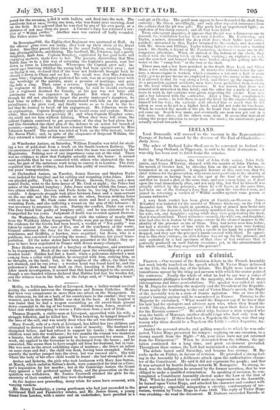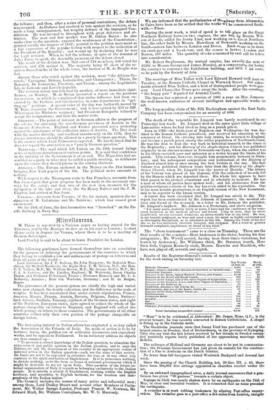fortign ituh Colonial.
FRANCE.—Our resume of the Revision debate in the French Assembly last week briefly touched on the speech which M. Victor Hugo delivered on the 17th, the fourth day of the debate. The Right were excited to tumultuous uproar by the sting and sarcasm with which the orator pointed his sentences. Nearly the whole of what he had to say was a series of epigrammatic philippics levelled at the majority, who retorted by sharp interruptions and fierce gesticulations. The speaker was called to order by M. Dupin for insulting the majority and the President of the Republic. Front nearly the beginning to the end of Victor Hugo's speech, the Right of the Assembly was in a state of frantic agitation. One or two of the orator's burning sayings will be remembered in France. Turning to the Majority he exclaimed, "What would the Emperor say if he knew that his heir had for apologists and advisers men who, when they heard the words 'liberty, democracy, progress,' fell flat upon their faces to listen for the Russian cannon ? " He asked why, because a man reigned who won the battle of Marengo, another should reign who had only won the battle of Satory ? If there had been a Napoleon the Great, was that any reason why there should be a Napoleon the Little ?—after Augustus, Au- g,ustulus ? Amidst the personal attacks and galling remarks to which he was sub-' jected, Victor Hugo preserved his temper ; replying on one occasion, to a stormy assault from the Right—" Ah, your ideas have not yet returned from the Emigration !" When he descended from the tribune, the agi- tation continued for a long time, and great excitement prevailed. Throughout these scenes, the Left had maintained a calm attention.
The debate lasted until Saturday, and became less stormy. M. Ba- roche spoke on Friday, in favour of revision. He provoked a strong feel- ing in the Assembly by a deliberate attack upon the authoritative charac- ter of the Constituent. He said it did not represent the people; and that it was actuated by hostile feelings towards M. Bonaparte. So strong, in- deed, was the indignation he aroused by the former assertion, that he was obliged to make a qualified retractation. In speaking of revision, he con- templated a Constituent Assembly elected under the Law of the 31st of May. When he found that he could make no impression on the Assembly, he turned upon Victor Hugo, and attacked his character and conduct with great asperity ; especially misquoting a circular, condemnatory of ter- rorism, written by Victor Hugo in June 1848. The reply of Victor Hugo was crushing—he read the document. M. Dnfaure succeeded Baroche at the tribune ; and then, after a series of personal contentions, the debate was resumed. As Dufaure had resolved to vote against the revision, so he made a long, unimpassioned, but weighty defence of the impugned Con- stitution. He was listened to throughout with great deference and at- tention. The next and last speaker was M. Odilon Barret: he also spoke close to the question ; exposed the weaknesses of the Constitution ; painted vividly the dangers of 1852; pointed to the petition movement as a fair expression of the popular feeling with respect to the reelection of the President of the Republic ; and wound up by declaring that he was for legal revision. When he left the tribune, in spite of the demand of Jules Fevre to speak, the Assembly pronounced the debate closed. The result of the division was, that out of 724 members, 446 voted for revision, and 278 against it. The majority being 97 short of the re- quired three-fourths of the whole votes, the motion of M. de Broglie was
lost. Among those who voted against the revision, were "the African Ge- nerals," Cavaignae, Bedeau, Lamoriciere, and Changarnier ; Thiers, De Remusat, De Lamartine, Piscatory, and Creton ; among the Legitimists, Leo de Laborde and Larochejaquelin.
The revision defeat was followed by another, of more immediate signi- ficance, on Monday. M. de Melun presented a report on the petitions for revision, in which he complained that undue influence had been ex- ercised by the Prefects and functionaries in some departments in "get- ting up" petitions. A special order of the day was forthwith moved by M. Bare, censuring the Government ; and it was carried by 333 to 320. Whereupon the Ministers resigned ; but President Bonaparte refused to accept the resignations ; and here the matter rests. GERMAN Y.—The point of interest in German affairs is the progress of the scheme for annexing the non-German provinces of Austria to the Gil-manic Federation. England and France presented notes protesting against the admittance of the collective states of Austria. The Diet dealt with the matter directly, and resolved unanimously on the 17th, that no foreign interference should be allowed in a purely German question. This is the answer which Lord Palmerston expected. He has declared that he does not regard the annexation as a "purely German question."
PORTUGAL—The mail which left Lisbon on the 19th instant brings news of military disturbances at various points. It is said that confidence in the stability of the Government is at an end. The Miguelites had as- sembled as a party in what may be called a public meeting, to deliberate upon the course they should pursue in the coming elections.
AMEllICA.—The Europa anchored in the Mersey on the 21st instant, bringing New York papers of the 8th. The political news amounts to nothing. With respect to the Nicaraguan route to San Francisco, accounts from San J mm report that great progress has been made in the necessary sur- veys for the canal; and that two of the new iron steamers for the navigation of the lake and river, the Sir Henry Bulwer and the J. M. Clayton, had arrived at San Juan.
CANADA.—Aecounts from Toronto, of the 1st instant, mention the re- signation of M. Lafontaine and Mr. Baldwin ; which had caused great excitement.
On the 24th of June, the first locomotive was "launched" on the Pa- cific Railway in Navy Bay.



























 Previous page
Previous page